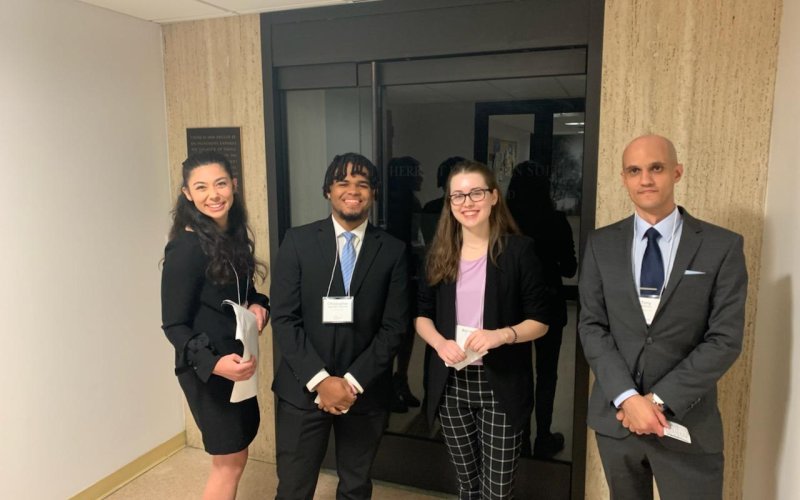UAlbany Students Compete in National Cyber Policy and Strategy Competition

ALBANY, N.Y. (Nov. 22, 2022) — Students from the College of Emergency Preparedness, Homeland Security and Cybersecurity recently competed in a strategy challenge that put their cybersecurity skills to the test against peers from across the nation.
The “Cyber 9/12 Strategy Challenge” was held at Columbia University’s School of International and Public Affairs earlier this month, hosting 22 teams from top higher education institutions such as Harvard and West Point. The multi-day event is designed to provide student teams, of up to four members, with a deeper understanding of the policy and strategy challenges associated with the management of a cyber crisis.
The competition challenged UAlbany’s team to assess fictional, but realistic attacks against critical infrastructure around the world. One of them included an advanced persistent threat actor who infiltrated the systems of a hydroelectric facility in New York.
Students first were asked to develop a situation brief before the competition, responding to a 32-page scenario with a one-page summary of key threats and policy objectives. On the day of competition, the team went before a panel of judges who were representing the Deputies Committee of the National Security Council (NSC), to give a 10-minute oral brief. The judges critiqued and probed the students’ analysis and reasoning, offering professional development and networking opportunities.
Four students represented the UAlbany “Cyber Danes,” guided by the expertise of CEHC Professor of Practice David Turetsky and Assistant Professor Unal Tatar.
“We were able to meet other students and experts in the field of cybersecurity and learn about the many different paths you can take in cyber,” said Brianna Bace, a senior majoring in Political Science and Emergency Preparedness, Homeland Security and Cybersecurity (EHC). “What I like most about Cyber 9/12 is you typically start the competition knowing little to nothing about the scenario’s topic. By the end of the competition, you have a plethora of knowledge about new subjects and the role cyber plays in each.”
“Our time to analyze really complex intelligence and devise solutions was extremely limited,” added Tony Ventura, a junior EHC major. “The intensity you get from that is something I want to be a part of my career. I like working under pressure in high-impact situations, and every team member, including our coaches, handled it well. By the end, we were all proud of each other.”
The keynote address for the competition was delivered by Kemba Walden, the principal deputy national cyber director at the White House’s Office of the National Cyber Director. Graham Brookie, senior director of the Digital Forensic Research Lab at the Atlantic Council, delivered the welcome address.
UAlbany has competed in several Cyber 9/12 competitions over the last few years, including fielding an all-female student team that competed remotely in summer 2020, through a competition based in Geneva, Switzerland. Last year’s team was the only one from a public institution that advanced to the semifinals.
Other UAlbany team members this year included Rian Davis, a senior EHC major, and Christopher Sanchez, a sophomore EHC major.
Bace, Davis and Ventura are also participants of UAlbany’s Virtual Institute of Cyber Operation and Research, which aims to accelerate and focus the development of foundational expertise in critical cyber operational skills for future military and civilian leaders.





